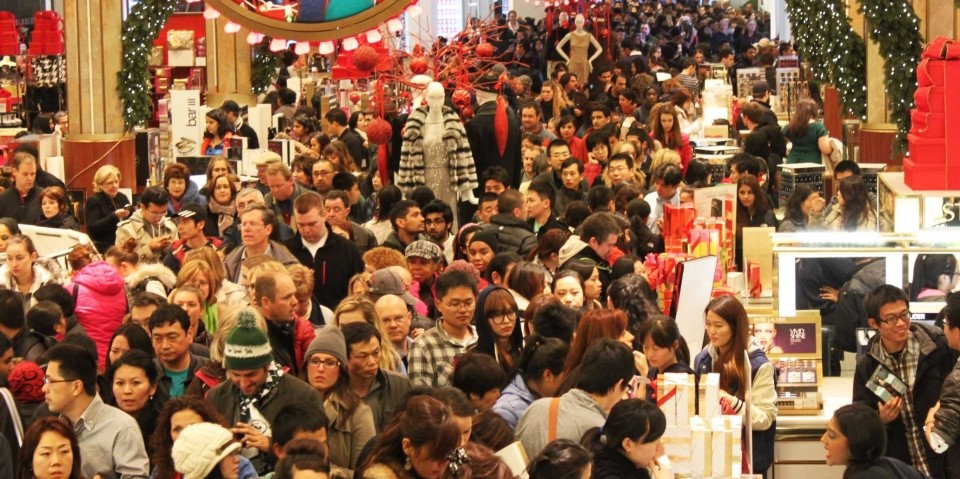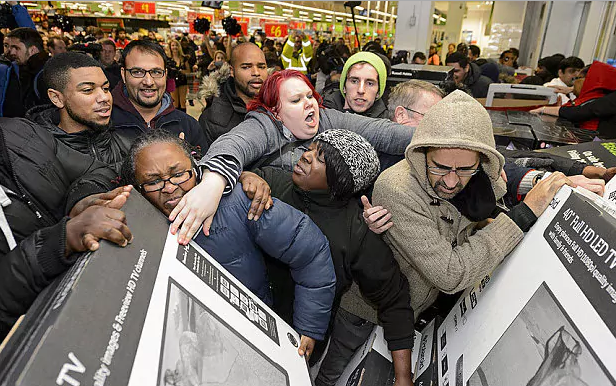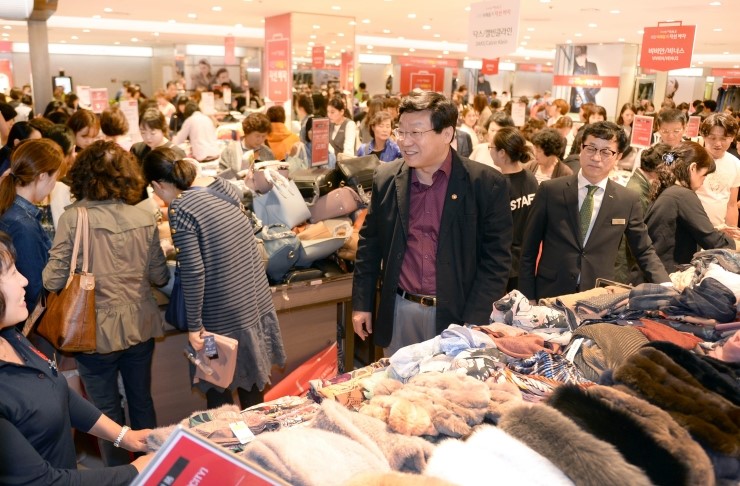 |
| ▲ A crowded mall in Black Friday |
This November is a special month for Americans, and even many people around the world, because of the US presidential election scheduled for November 8. But November isn’t only about elections. Every fourth Thursday in November in the USA is Thanksgiving Day, arguably the biggest holiday marked in the country. The day after however, is the country’s biggest nationwide sale day, commonly known as Black Friday. This mega sales event accounts for 20 percent of annual consumption in the United States. But not everyone who shops on Black Friday is American. Koreans also get on board, using online shopping sites to access the discounted merchandise. So how did this shopping phenomenon get started? What is the goal of the famous discount day and what does it mean to shoppers in the US and abroad? Most people cannot answer these questions but we will attempt to do so in this article.
The term, Black Friday refers to a day in the year when people traditionally stock up products at a cheaper price. Sellers entice customers with huge reductions, encouraging them to buy. In accounting, red ink traditionally represents a deficit in your accounts while black ink refers to a surplus. By calling the sales event Black Friday, they are offering consumers the impression they have surpluses and need to clear out stock.
However there is another story behind the term Black Friday. Historians suggest at first, it had a negative connotation. By their accounts, the term Black Friday originated in Philadelphia in the 1950s, when Americans first poured into shops in Philadelphia to take advantage of savings on offer causing traffic jams across the city. Police were eventually called to the scene to control the mobs of bargain hunters and maintain peace and order. As a result, people dubbed the sales event Black Friday in order to describe the chaotic situation, lending a negative meaning to the event. Unfortunately, these types of dangerous scenes remain prevalent today, as consumers continue to fight over the limited products on the shelves. For example, it was reported that in Los Angeles, a woman used tear gas on shoppers in the electronics section of Walmart to secure access to the goods she wanted. Fortunately, only 20 people suffered minor injuries. In Manhattan, shoppers who were waiting in front of Hollister, a brand name clothing store, stole merchandise off the racks. In Arizona, another Walmart was the target of a bomb threat forcing shoppers to evacuate. In Colorado Springs, shootings were reported at Black Friday sales events.
 |
| ▲ Aggressive people who want to get limited products |
But while there may still be a fight for goods on Black Friday, it’s not all bad news. When Black Friday begins, people purchase goods at discounted prices and the increased demand stimulates the domestic market economy. This is not only good for the US, but also their trading partners that export products to the States.
So with the pluses and minuses in mind, what it really like to shop during Black Friday? The Dankook Herald (DKH) interviewed shoppers with some experience to find out more. Ms. Choi (28) said, “The mood is festive. There is a Thanksgiving Day parade in New York, before the Black Friday event begins. Everyone enjoys the atmosphere until the sales begin.” Also, Ms. Park (25) said, “There are many promotions on offer from offline and online shopping malls like Sephora, and IHerb. After this sale, they start Christmas sales, and year end and beginning events, so people can buy cheaper products right up until the middle of January. Black Friday is just the catalyst of long list of sales events consumers can take advantage of.” The DKH learned that Americans can buy anything from stationary to electronics, clothes, and furniture products, through these big sales events. Kim Su-min (UIUC) who lives in the US said “The most popular products are electronics and luxury items. It is important to remember the ‘pre-sale’ events too. Some department stores try to get the jump on their competition and launch sales prior to Black Friday, so in effect on Black Friday, there isn’t much more of a sale on offer.”
The DKH asked what it was like to shop on Black Friday. Lim Ji-ah (30) said, “People are more nervous on that day. They fight with other shoppers for the limited products on the shelves. I had a run in with a male driver who raced me to get to the shop. Fortunately, I avoided him, but I realized that anything dangerous can happen during the time because people are aggressive and can also use guns.” She added, “When Black Friday comes, there are lots of people in department stores, shops, and on the streets. Occasionally, there are demonstrations to draw attention to other matters as well.”
Lastly, the DKH asked for their opinions about Black Friday. They all agreed that shoppers needed to be careful. Ms. Kim (24) said “I have experienced the chaos inside a shopping mall. People did not care if someone fell down, they would simply step on him or her. So you have to be very careful if you are in the U.S.A. shopping on Black Friday.” Lim Ji-a (30) also said that, “Customers should also consider their consumption plans. You will buy things impulsively if you don’t have any plans. In addition, the government and local communities should put in place precautionary measures to address traffic congestion and air pollution as too many people gather to take advantage of the reduced prices,” she said of the personal and public problems.
 |
| ▲ There are many people who are shopping in the period of Korea Sale Festa |
Black Friday is not just a grand sale, but a national festival. Furthermore, it also has become an international event, influencing many countries in Europe and Asia to host similar events. Firstly, in the United Kingdom, people mark the day after Christmas (December 26) as ‘Boxing day’. On this day, consumers take advantage of sales and markdowns across the country. Celebrated on the day after Christmas the event originated from gifting boxes to poor people and soon spread to many European countries. It was eventually designated as a public holiday.
The second country with a major sales day is China. In China, November 11 is known as ‘Singles Day’, which literally means a day for singles and it is also China’s largest sales event. E-commerce giant Alibaba, recorded about 16 trillion won in sales in 2015 on Singles Day. Single’s Day, China’s Black Friday, is unlike the American or British events as it deals only with online shopping malls as the country only holds the event through shopping websites.
 |
| ▲ A poster, Korea Sale Festa, which is Black Friday for Korean version |
Lastly in Korea, Koreans benefit from a powerful stimulus from Black Friday with the domestic event ‘Korean Grand Festa’ otherwise known as ‘Koreas Black-Friday’ or the ‘K-Sale Day.’ The Korean Sale Festa was held this year from September 29 to October 31. Many department stores and supermarkets participated in the event such as Shinsegae, Galleria, Lotte, Emart, Homeplus and Lottemart. Online shopping malls, known as social-commerce site such as Coupang, Ticketmonster, and Wemakeprice, which didn’t participate last year, also got involved in the 2016 event. In addition, the government helped 400 local markets participate, so they would not be left out. The event garnered international attention as organizers added 55 cultural events around the country to draw attention to Festa. Using the popularity of the Korean Wave, organizers arranged performances from K-pop stars, biennale events in Gwangju, and festivals that taught foreigners about Hangeul (Korean language). The goal of Festa was to bring together Koreans and foreigners in a fun and relaxing atmosphere, so it was also supported by sales in airfares to and around Korea and by discounted accommodation across the country.
Many countries hold sales events around this time of year, but there are small differences in terms of character. Many are still undergoing a development period of trial and error and learning from their experiences in the process. In future, we hope to see these events flourish with the cooperation of national and local governments and the participation of both small and medium sized businesses together with our larger more established companies. Together we can use this period to create a lasting stimulus in the domestic and international economies.
권유영, 홍석준, 한유정 dankookherald@gmail.com

![[Campus Magnifier] Let's Surf the Library!](/news/photo/202404/12496_1765_4143.jpg) [Campus Magnifier] Let's Surf the Library!
[Campus Magnifier] Let's Surf the Library!
![[Campus Magnifier] Let's Surf the Library!](/news/thumbnail/202404/12496_1765_4143_v150.jpg)





